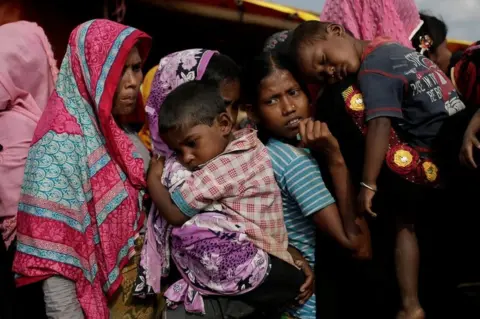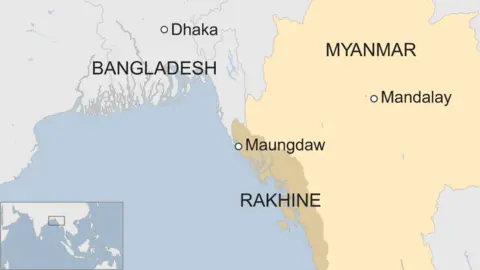Rohingya crisis: Bangladesh will no longer take in Myanmar refugees
 Reuters
ReutersBangladesh has told the UN Security Council it will stop accepting any more Rohingya Muslims who flee from Myanmar.
Foreign Secretary Shahidul Haque accused Myanmar of "hollow promises" during negotiations over returns.
More than 740,000 Rohingya are in camps in Bangladesh after they were driven out of Myanmar's Rakhine state during military crackdowns in 2016 and 2017.
The UN describes the crisis as ethnic cleansing. Myanmar denies persecuting the Rohingya, a stateless minority.
The latest row comes despite a deal between Bangladesh and Myanmar in January 2018 to repatriate Rohingya refugees.
Myanmar had agreed to accept 1,500 Rohingya each week, Bangladesh said at the time, adding that it aimed to return all of them to Myanmar within two years.
Speaking at Thursday's meeting of the UN Security Council, Mr Haque said his country could not accept more refugees.
"Not a single Rohingya has volunteered to return to Rakhine due to the absence of conducive environment there," he said.
"Is Bangladesh paying the price for being responsive and responsible in showing empathy to a persecuted minority population of a neighbouring country?"
Myanmar's ambassador to the UN, Hau Do Suan, appealed for patience, speaking of "huge physical as well as psychological barriers" in repatriating Rohingya.
"It takes time and patience as well as courage to build trust and confidence among different communities in Rakhine," the diplomat added.
Meanwhile, the UN envoy to Myanmar, Christine Schraner Burgener said progress in returning Rohyngya to Myanmar was "slow".
She also said that Myanmar authorities had given UN agencies "insufficient" access to help repatriate Rohingya.

